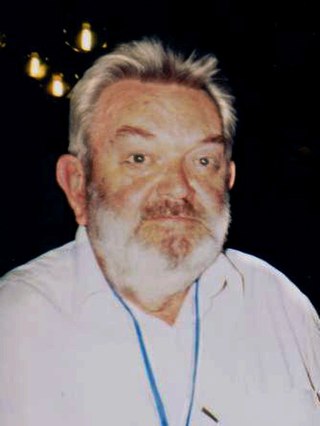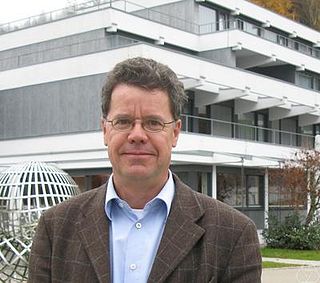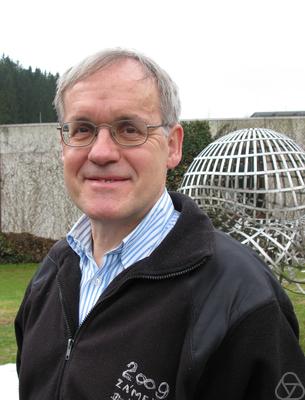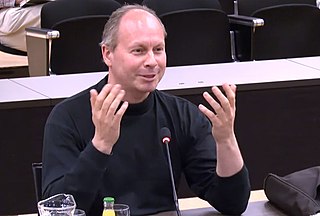Andrew D. Gordon is a British computer scientist previously employed by Microsoft Research. His research interests include programming language design, formal methods, concurrency, cryptography, and access control.

Martinus Justinus Godefriedus "Tini" Veltman was a Dutch theoretical physicist. He shared the 1999 Nobel Prize in physics with his former PhD student Gerardus 't Hooft for their work on particle theory.
The Centrum Wiskunde & Informatica is a research centre in the field of mathematics and theoretical computer science. It is part of the institutes organization of the Dutch Research Council (NWO) and is located at the Amsterdam Science Park. This institute is famous as the creation site of the programming language Python. It was a founding member of the European Research Consortium for Informatics and Mathematics (ERCIM).

Joseph Amadee Goguen was an American computer scientist. He was professor of Computer Science at the University of California and University of Oxford, and held research positions at IBM and SRI International.
Algebraic specification is a software engineering technique for formally specifying system behavior. It was a very active subject of computer science research around 1980.
The term "information algebra" refers to mathematical techniques of information processing. Classical information theory goes back to Claude Shannon. It is a theory of information transmission, looking at communication and storage. However, it has not been considered so far that information comes from different sources and that it is therefore usually combined. It has furthermore been neglected in classical information theory that one wants to extract those parts out of a piece of information that are relevant to specific questions.

Hendrik Willem Lenstra Jr. is a Dutch mathematician.

Mark Burgess is an independent researcher and writer, formerly professor at Oslo University College in Norway and creator of the CFEngine software and company, who is known for work in computer science in the field of policy-based configuration management.

Faron George Moller is a Canadian-born British computer scientist and expert on theoretical computer science, particularly infinite-state automata theory and temporal logic. His work has focussed on structural decomposition techniques for analysing abstract models of computing systems. He is founding director of the Swansea Railway Verification Group; Director of Technocamps; and Head of the Institute of Coding in Wales. In 2023, he was elected General Secretary of the Learned Society of Wales.
John Vivian Tucker is a British computer scientist and expert on computability theory, also known as recursion theory. Computability theory is about what can and cannot be computed by people and machines. His work has focused on generalising the classical theory to deal with all forms of discrete/digital and continuous/analogue data; and on using the generalisations as formal methods for system design; based on abstract data types and on the interface between algorithms and physical equipment.

Promise theory is a method of analysis suitable for studying any system of interacting components. In the context of information science, promise theory offers a methodology for organising and understanding systems by modelling voluntary cooperation between individual actors or agents, which make public their intentions to one another in the form of promises. Promise theory is grounded in graph theory and set theory.
Jan Hendrik van Schuppen is a Dutch mathematician and Professor at the Department of Mathematics of the Vrije Universiteit, known for his contributions in the field of systems theory, particularly on control theory and system identification, on probability, and on a number of related practical applications.

Izak "Ieke" Moerdijk is a Dutch mathematician, currently working at Utrecht University, who in 2012 won the Spinoza prize.
Jan Willem Klop is a professor of applied logic at Vrije Universiteit in Amsterdam. He holds a Ph.D. in mathematical logic from Utrecht University. Klop is known for his work on the algebra of communicating processes, co-author of TeReSe and his fixed point combinator

Alexander (Lex) Schrijver is a Dutch mathematician and computer scientist, a professor of discrete mathematics and optimization at the University of Amsterdam and a fellow at the Centrum Wiskunde & Informatica in Amsterdam. Since 1993 he has been co-editor in chief of the journal Combinatorica.

Michiel Hazewinkel is a Dutch mathematician, and Emeritus Professor of Mathematics at the Centre for Mathematics and Computer Science and the University of Amsterdam, particularly known for his 1978 book Formal groups and applications and as editor of the Encyclopedia of Mathematics.

Christopher (Chris) Verhoef is a Dutch computer scientist, and Professor of Computer Science at the Vrije Universiteit in Amsterdam.

Leendert (Leon) van der Torre is a professor of computer science at the University of Luxembourg and head of the Individual and Collective Reasoning (ICR) group, part of the Computer Science and Communication (CSC) Research Unit. Leon van der Torre is a prolific researcher in deontic logic and multi-agent systems, a member of the Ethics Advisory Committee of the University of Luxembourg and founder of the CSC Robotic research laboratory. Since March 2016 he is the head of the Computer Science and Communication (CSC) Research Unit.
Scott A. Smolka is a SUNY Distinguished Professor in the Department of Computer Science at Stony Brook University, Stony Brook, New York.
Krzysztof R. Apt is a Polish computer scientist. He defended his PhD in mathematical logic in Warsaw, Poland in 1974. His research interests include program correctness and semantics, use of logic as a programming language, distributed computing, and game theory. Besides his own research, he has been heavily involved in service to the computing community, notably by promoting the use of logic in computer science and by advocating open access to scientific literature.










